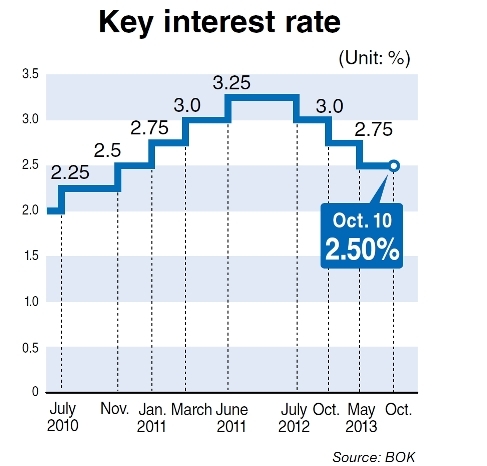
The Bank of Korea on Thursday revised its 2014 growth outlook for the Korean economy down to 3.8 percent from its initial forecast of 4.0 percent after its monetary policy committee unanimously decided to keep its key base rate unchanged at 2.5 percent for October.
Growing external uncertainties stemming from a government shutdown and debt-ceiling woes in the U.S. as well as the U.S. quantitative easing tapering in the near term far outweighed Korea’s expectations of a solid recovery next year.
Korea’s growth forecast by the BOK for this year remained unchanged from its earlier projection in July at 2.8 percent.
The central bank’s 2014 revision followed that of the International Monetary Fund, which reported that Korea is set for a “modest recovery” backed by its fiscal and monetary stimulus.
But the IMF’s 2014 growth for Korea has been revised down from 3.9 percent to 3.7 percent on weaker global demand.
“The Korean central bank revised Korea’s 2014 outlook reflecting the IMF’s recent forecast change,” BOK Gov. Kim Choong-soo told reporters after its monetary policy meeting.
Also, rising energy prices driven by geopolitical risks in the Middle East and China’s slowdown led the BOK to change its economic outlook.
The governor added that it maintained its key rate for the fifth straight month, citing Korea’s modest growth trajectory backed by improved economic data such as exports, consumption and investment.
However, persisting risks concerning the U.S. economy were overshadowing the prospects for the Korean economy, making the central bank cut its 2014 forecast. The BOK’s 2014 outlook is 0.1 percentage point lower than the Ministry of Strategy and Finance’s forecast of 3.9 percent.
“The tapering of the U.S. quantitative easing shows two sides of the world’s largest economy ― one is that such a move reflects that the U.S. economy is recovering, while it could (adversely) affect the financial markets,” Gov. Kim explained.
Considering stable oil and farm product prices, the BOK also cut its consumer inflation projection for this year to 1.2 percent from its earlier estimate of 1.7 percent. The 2014 inflation outlook was also dropped to 2.5 percent from 2.9 percent.
Analysts said that even though Korea has sound economic fundamentals, increasing debt including household debt poses a downside risk to Asia’s fourth-largest economy.
“Given Korea has strengthened its economic fundamentals and extended the maturity profile of its stable external debt, we believe Korea is in a stronger position than in 2008 to weather its financial system from external shocks over the immediate horizon.”
“But the increase in long-term external debt implies that policymakers will need to sustain Korea’s strong fundamentals over the medium term.” HSBC Global Research said in a report.
The country’s high household debt remained a “key issue” as it reached over 150 percent of disposable income, the HSBC report noted, adding that this could further make it harder for the mid-income earners.
By Park Hyong-ki
(
hkp@heraldcorp.com)








